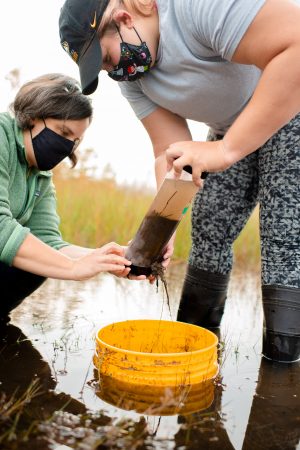Professor Amy Marcarelli and a multi-disciplinary team have received a two-year, $300,000 NSF grant. The grant from the National Science Foundation is to study the relationships between organic matter and micro-organisms in streams.
An ecosystems ecologist, Marcarelli is leading a team of Michigan Tech ecosystem scientists, microbiologists, environmental chemists, and data scientists. The researchers are conducting detailed laboratory experiments to gather data on how microbial communities work together to process complex mixtures of dissolved organic matter in streams. Steve Techtmann, associate professor of Biological Sciences and an environmental microbiologist, is doing all the microbial work on the project in his lab at Michigan Tech.
Dissolved organic matter comprises many different kinds of molecules that come from terrestrial and aquatic plants and microbes. The researchers expect different microbes that live in streams to be specialized to break down these different molecules.
“We expect the relationships to be extremely complicated,” Marcarelli says.
They are looking at rates of respiration, carbon breakdown, and energy release. They hope to discover how the characteristics of dissolved organic matter and stream microbes can explain rates of carbon dioxide emission from streams.
The researchers will use the data to develop machine-learning models. “The relationships between the organic matter and micro-organisms might not be evident in simpler analysis methods,” Marcarelli explains.
The current work is the start of a much larger project. “We hope to build on the results of this project with a much bigger proposal for a large field project,” she says.
And why is this work important? “Although we, as a field, have studied carbon dioxide production and emission across many different streams, we can only predict a small amount of the variation we see based on environmental characteristics like temperature,” Marcarelli explains. “We think there is an important role of both microbes and organic matter structure that contributes to this variability, and understanding that is important for predicting these emissions in the future and response to global changes like climate and land use change.”
Marcarelli is the director of the Ecosystem Science Center at Michigan Tech.
This blog post initially appeared in the Fall 2022 Biological Sciences Newsletter. Read this article and others like it today.
